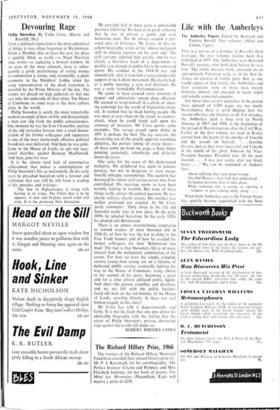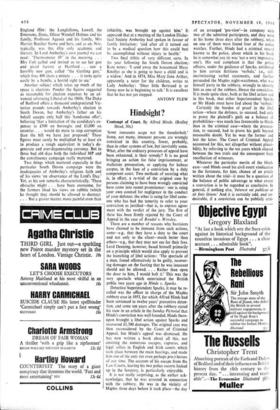One seeks for the cause of this deep-rooted malignity. His
childhood was spent in genuine poverty, but not in desperate or even excep- tionally unhappy surroundings. The accident that destroyed his minor civil service career may have contributed. His marriage seems to have been notably lacking in warmth. But none of these things really answer the central question. He was clearly solitary, clearly ascetic. His intellect was neither profound nor original. As Mr Cross justly comments: `Only twice in his life did Snowden really take in new ideas. In the early 1890s he adopted Socialism. In the early 1920s he adopted anti-Bolshevism.'
There is an almost overwhelming temptation to remind readers of what Snowden did in 1930-31, of how he was the last to cling to the Free Trade banner, and of how he assailed his former colleagues for their 'Bolshevism run mad.' The fact is that Snowden's life is of more interest than the melancholy culmination of his career. For here we have the simple, crippled, austere young man setting out on a lifetime of dedicated public service; eventually fighting his way to the House of Commons; rising almost to the summit of his party; becoming a great and for a time almost adulated public figure. And then—the picture crumbles and dissolves, and we are left with the pallid, hatchet- faced old man on the red benches of the House of Lords, scowling bitterly. Is there not real human tragedy in this story?
Mr Cross has told it dispassionately and fairly. It is not his fault that one puts down his admirable biography with the feeling that the secret of Philip Snowden's private, devouring rage against the world still eludes us.
ROBERT RHODES JAMES
The Richard Hillary Prize, 1966
The trustees of the Richard Hillary Memorial Fund have awarded their annual literary prize to: Mr P. J. Kavanagh, for his autobiography, The Perfect Stranger (Chatto and Windus); and Miss Elizabeth Jennings, for her book of poems, The Mind has Mountains (Macmillan). Each will receive a prize of £250. The Amberley Papers. Edited by Bertrand and Patricia Russell. Two volumes. (Allen and Unwin, 5 gns.)
Tuts is a reissue of a product of Russell's third marriage, the two volumes having been first published in 1937. The Amberleys were Bertrand Russell's parents, who both died before he was four. The whole massive work, executed on an appropriately Victorian scale, is, in the first in- stance, an exercise in family piety. But, as one would expect of that family, the Amberleys and their associates were of more than merely domestic interest and engaged in many wider and usually contested concerns.
For those who are not specialists in the period these upward of 1,100 pages are too much. Nevertheless, there is good dipping here for anyone who has any interests at all. For instance, the Amberleys paid a long visit to North America in 1867 and 1868, at the beginning of the period of Reconstruction after the Civil War. Earlier in the first volume we read in Kate's journal how she learnt of the murder of Lincoln
and the assault on Seward : . . horrible disaster, just as they were successful and Lincoln in the zenith of his glory. Johnson the Vice- President becomes President now till the next election. . . . I was just seeing after my black ducks. . . .' We can be reminded of Auden's lines: About suffering they were never wrong, The Old Masters: how well they understood Its human position; how it takes place
While someone else is eating or opening a window or just walking dully along. . . .
When both Amberleys got to the United States they quickly became acquainted with the New 656































 Previous page
Previous page